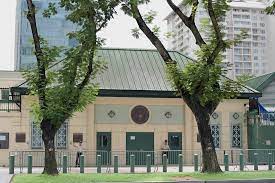Take steps to student visa interview (F-1 visa)

Step 1: Receive and Review Acceptance Materials
Your admission packet will include your acceptance letter and I-20 form. Review all of the documents in your acceptance packet and ensure that the information is correct, including the spelling of your name, your birth date, your intended major, and your program dates. Don't forget to sign the bottom of your I-20 form. If you are younger than 18, your parent or guardian must also sign the form.
Step 2: Pay the SEVIS I-901 Fee
You must have your passport and your I-20 form(immigration document) before you pay the SEVIS fee. You can pay the I-901 fee online. Print the receipt and keep it with your I-20 form. You need the SEVIS receipt to sign up for the visa interview application. You also need your SEVIS receipt at the visa interview. If you have questions about the I-901 fee, please read the SEVP FAQs page.
Step 3: Schedule Your Visa Interview
Except for Canadian citizens, all international students must have an F-1 visa to study in the U.S. Find your nearest U.S. embassy or consulate and complete the DS-160 to schedule your F-1 student visa interview. Interview wait times vary by embassy, so check your estimated wait time in advance. You may apply for a visa up to 365 days before the start date of your academic program.
Step 4: Prepare for Your Visa Interview
Take the following documents with you to your VISA Interview:
- I-20 document and support letter from school
- Visa application and processing fee (DS-160 confirmation, Visa interview receipt, Interview appointment confirmation)
- SEVIS receipt
- Passport size photo
- High School transcripts (original)
- Financial Affidavit (for example: bank statements, tax records, proof of sponsorship, Certificate of Deposit)
- Valid Current Passport
Interviews are brief, and consular officers usually make a decision based on impressions formed during the first few minutes. The officer may ask about your intentions or prospects for future employment, family or other relationships, educational objectives, and long-term plans in your home country. Speak English if possible, listen carefully to the question asked, keep your answers short and to the point, be familiar with Seattle Colleges and how it fits into your career plan, and be prepared to answer why you want to study a particular program in the United States. During your visa interview, you must demonstrate to the consular officer that you:
- Have strong ties to your home country and intend to return home after your studies in the U.S.
- Have sufficient funds to pay for your financial needs while you are studying in the U.S., including tuition, health insurance, housing and travel expenses, etc.
- Have legitimate intentions to study full-time and gain education and training that will be useful in your home country.
If you are approved for a student visa, Congratulations!
If you are denied a student visa, do not be discouraged. Many students do not get a visa the first time, and it can sometimes take two or three tries.After a visa denial, we recommend that you take the following steps:
- Do not argue with the officer. Politely ask for a written explanation of the refusal.
- Ask the officer what documents/information you will need to apply again.
- If you have not done so, read our recommendations for preparing for the interview.
- Review the information you submitted. Make sure your documents are in order.
- If the information you received is unclear, contact your agent or our office.
PREPARING FOR YOUR INTERVIEW:
You should be prepared to answer the following questions before you visit the American Consul in your country.
1. How are you going to finance your study in the United States? You will need to have all the details of this clearly defined.
2. What are the ways you can guarantee your return to your country? You may be asked to outline what ties you have to your country; for example, a job or offer of a job, business, property or other assets, family, social ties such as political office, etc.
3. What are your educational plans in the United States? For example, will you study for one year, attend a two-year community college, and then attend a four-year university? You should be prepared to discuss how long you intend to stay and what you plan to study.
4. What has been your educational preparation for study in the United States? For example, what are your educational credentials, your English language proficiency and your admission status to a particular school?
5. How do you plan to use your United States education when you return to your country? These are the most common questions that you may be asked. The visa officer may ask other questions. Your interview will be in English, so practice before you attend your appointment. Keep in mind that the interview will be short, so do your best to make a good first impression. Bring documentation regarding the above five points with you to the interview.